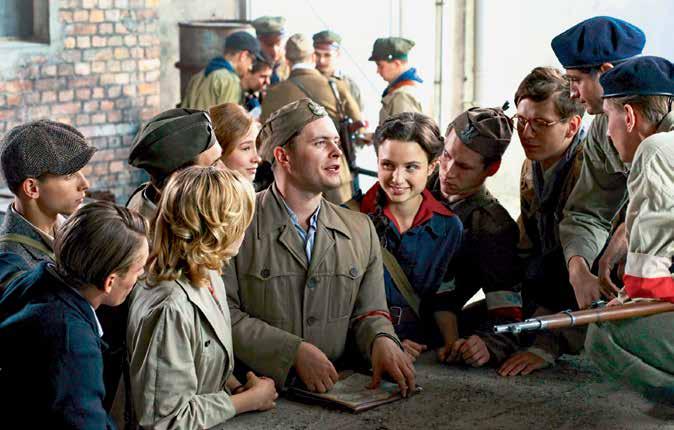
5 minute read
Cinema
Cinema loves Poland

Advertisement
Variety review of The Red Spider (bELOW) by Marcin Koszałka:
‘As puppetmaster, Koszałka demonstrates an elegant and confident touch, operating as much as possible in the ‘pure cinema’ tradition, where strong visual scenes are allowed to unfold without the crutch of explanatory dialogue or helpful audio clues, beyond a few snatches of radio broadcasts and a low, dread-building score’ •
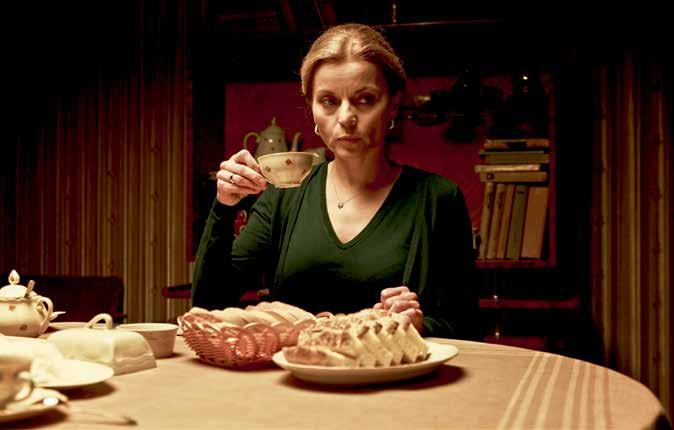
Still from Papusza directed by Krzysztof Krauze and Joanna Kos-Krauze
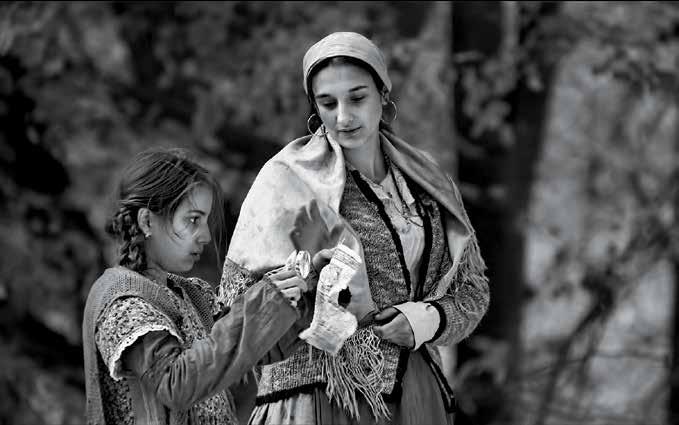
There once was a land where there lived a Golden Oscar and a Silver Bear… Sound like the beginning of a fairy tale? It’s no accident. The situation in Polish cinema has changed in the last few years as if touched by a magic wand. It’s not just about the longoverdue recognition of classic Polish films, which Martin Scorsese admired so much he organized a worldwide tour of 21 films by directors like Wajda, Has, Kawalerowicz, Zanussi and Kieślowski. A new generation of talents has come of age. As the old grandmaster Andrzej Wajda puts it, ‘Polish film has recently taken the lead. It is not only finding a receptive Polish audience, but also finding a place in the world where it wins awards. It is pulling itself up after years of difficulty’. In February 2015, Małgorzata Szumowska won a Silver Bear for Best Director at the Berlin International Film Festival for Body. She says she made a film about Poland as a body-tired, unloved, neglected. She admits in interviews that, for her, ‘Polishness’ is not a cross to bear, and that she wants to continue to make films here. For her, Poland is the inspiration.
Likewise for another director, one who lived for decades in the UK but achieved his greatest success with a modest black-andwhite film set in the times and country of his childhood. This obviously means Paweł Pawlikowski (below), winner of the first Polish Oscar for best foreign film, Ida (below lefT). He calls Ida a ‘love letter to Poland’, its mindset, music and art.
The country also attracts young foreign filmmakers, the best example being Magnus von Horn from Sweden. He came to Łódź several years ago to study at the famed Polish National Film School and stayed. He shot his first film in Swedish, but most of the crew were Polish artists and professionals. The Here After premiered at the Cannes Festival – the world championships of film.
Audiences in Poland love new Polish cinema. Polish films dominated last year’s box office figures, even beating the international mega-production of The Hobbit. Why? Directors have finally reached out to audiences, offering crime films, thrillers, dramas, comedies, and historical pictures, produced to a high standard and with passion. Viewers are also attracted to Polish cinemas because the cinemas themselves have evolved, offering a well-selected repertoire, discussions after the film and meetings with the creators, all of which create a sense of community. Even at Polish film festivals where the latest offerings from Cannes, Berlin or Venice are shown, tickets for Polish films sell the fastest •
Agnieszka Holland, director
‘The international prizes our films are earning prove they are being made to increasingly high standards. It’s clear that in the past few years Polish cinema has been revived. It has risen like a phoenix from the ashes, and for this Ida is a beautiful crowning achievement. I hope this will give everyone else a jolt. It shows that it doesn’t pay to take the easy route. You have to aim high’ •
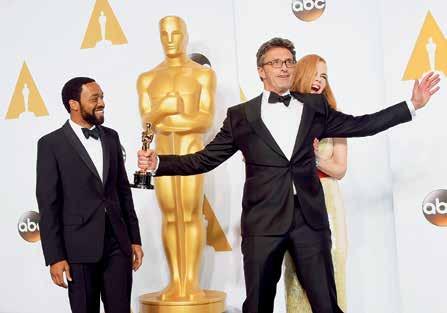
Still from Bogowie (Gods) directed by Łukasz Palkowski

Marcin Wrona, feature film director. His third film, Demon (AbOVE), tells about the incredible goings-on at a wedding reception. Marcin Wrona died on 19 September 2015 during the Gdynia Film Festival.

‘Increasingly varied films are appearing in Poland, and our pictures are screened at the best festivals in the world: Berlin, Venice, Toronto… This is linked with a transparent system for subsidizing productions by the Polish Film Institute. This doesn’t mean that films are easier to shoot now than they were 10 years ago, when I was starting out. There’s more competition, but thanks to that, the level of Polish films is higher. To capture the attention of the viewer, you have to offer an interesting screenplay that addresses some important issues, but in an appealing way. And while telling Polish stories, it needs to be universal and understandable for international audiences. This is the greatest challenge and art’ •
Documentary filmmakers have achieved great success, winning awards not only in Poland but also at festivals in Locarno, Amsterdam and Copenhagen. The old masters like Marcel Łoziński and Jacek Bławut still make films, but they have also brought up the next generation of directors.
One of the most talkedabout documentaries of recent years is the diptych directed by Marcel and Paweł Łoziński (RIGhT), Father and Son and Father and Son on a Journey. It records a joint excursion to Paris, but presented differently by the two directors. This raises questions about the methods employed by contemporary documentary filmmakers •
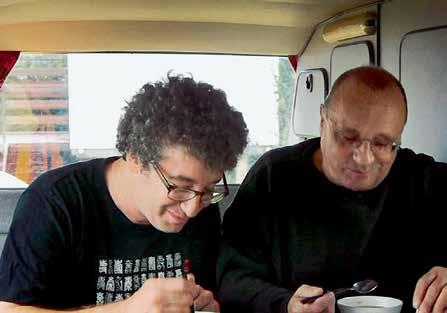
Małgorzata Kuzdra, director of the Muza cinema in Poznań. Are we to only see films in multiplexes wrapped in the smell of popcorn? Of course not, Kuzdra argues: ‘Art-house cinemas in Poland are cultural centres, combining tradition and modernity. Among independent cinemas operating in Poland, a third of them are art houses in the pure sense. There we create a carefully thought-out repertoire, presenting films that have won awards at the most important European film festivals, and prepare special events with added attractions. For example, during the Kino Dynamo event we installed four stationary bicycles below the screen which viewers used to generate the electricity needed for the projection. Most importantly, we are close to our viewers. We know them and maintain a dialogue with them. That’s why cinemas that are a perfect home for good films will always be needed’ •
Cinematic history hall of fame
Wojciech Kilar is Poland’s most popular film music composer, having composed the soundtrack to Francis Ford Coppola’s Dracula. The Silesian composer was very nearly asked to create the music to Peter Jackson’s Lord of the Rings as well, and has composed film music for directors such as Jane Campion, Andrzej Wajda and Roman Polański. Other Polish film composers whose work has also gone down in cinematic history include Krzysztof Komenda who created the soundtracks to Rosemary’s Baby and Knife in the Water, both directed by Roman Polański. Krzysztof Kieślowski’s films would also never have been produced if it weren’t for Zbigniew Preisner’s compositions. Another Polish composer, Jan A.P. Kaczmarek, was awarded an Oscar in 2003 for his music to Finding Neverland. The new hope for Polish film music is composer Stefan Wesołowski who created the music for a documentary about Marlon Brando •










